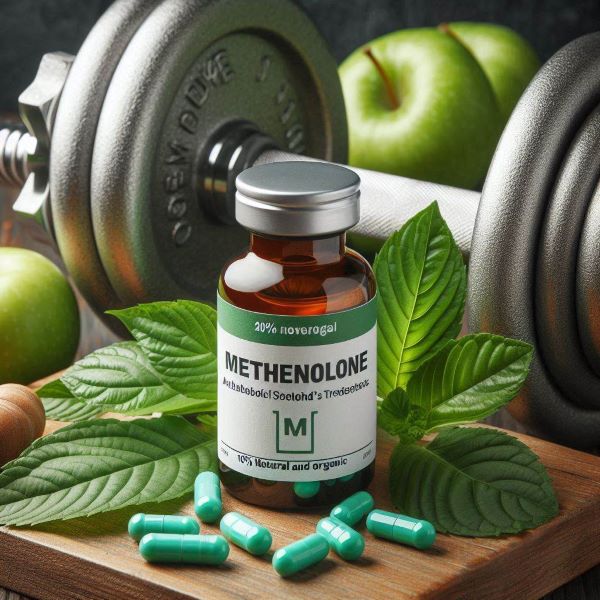Methenolone, commonly known by its brand name Primobolan, is an anabolic steroid that has gained popularity for its mild yet effective performance-enhancing properties. Known for its relatively low risk of side effects compared to other anabolic steroids, Primobolan is a preferred choice for athletes and bodybuilders looking to enhance muscle mass, strength, and overall physical performance. This article provides an in-depth look at Methenolone, covering its uses, benefits, risks, side effects, availability, and legal status. (Source)
What is Anabolic Steroid Methenolone (Primobolan)?
Methenolone, also known as Primobolan, is an anabolic-androgenic steroid (AAS) derived from dihydrotestosterone (DHT). It is available in two forms: Methenolone Enanthate (injectable) and Methenolone Acetate (oral). Primobolan is known for its moderate anabolic effects and low androgenic properties, making it a popular choice for those seeking to avoid the more severe side effects associated with other anabolic steroids. (Source)
Also, watch web stories: What is the best way to stay fit?
How Does It Work?
Methenolone works by binding to androgen receptors in the body, which stimulates protein synthesis, enhances nitrogen retention, and increases red blood cell production. These effects contribute to muscle growth, improved recovery, and enhanced endurance. Unlike many other anabolic steroids, Primobolan does not convert to estrogen, reducing the risk of estrogenic side effects such as water retention and gynecomastia. (Source)
Mechanism of Action
- Protein Synthesis: Methenolone enhances the body’s ability to produce proteins, essential for muscle growth and repair.
- Nitrogen Retention: It promotes a positive nitrogen balance, crucial for maintaining an anabolic environment in the body.
- Red Blood Cell Production: Methenolone increases erythropoiesis, improving oxygen delivery to muscles and enhancing endurance.
- Low Aromatization: Methenolone does not convert to estrogen, minimizing the risk of estrogenic side effects. (Source)
What are Its Uses?
Medical Uses
Methenolone was originally developed for medical purposes and is used to treat:
- Muscle Wasting Diseases: Methenolone is prescribed to treat conditions that cause muscle wasting, such as HIV/AIDS and chronic infections.
- Osteoporosis: It helps in increasing bone density and strength.
- Severe Weight Loss: Methenolone is used to promote weight gain in patients suffering from severe weight loss due to medical conditions. (Source)
Non-Medical Uses
In the athletic and bodybuilding communities, Methenolone is used for its performance-enhancing properties:
- Cutting Cycles: Primobolan is popular during cutting cycles for its ability to preserve lean muscle mass while promoting fat loss.
- Lean Muscle Gain: Athletes use Methenolone to gain lean muscle mass without significant water retention.
- Improved Endurance: The increased red blood cell production enhances oxygen delivery to muscles, improving endurance and performance.
- Pre-Contest Preparation: Bodybuilders often use Primobolan in the weeks leading up to a competition to achieve a more defined and vascular look. (Source)
Benefits
The benefits of Methenolone include:
- Muscle Preservation: Methenolone helps preserve lean muscle mass during cutting cycles.
- Fat Loss: It promotes fat loss, contributing to a leaner and more defined physique.
- Increased Endurance: Users experience improved endurance and stamina.
- Minimal Estrogenic Effects: Methenolone does not convert to estrogen, reducing the risk of estrogenic side effects such as water retention and gynecomastia.
- Mild Side Effects: Compared to other anabolic steroids, Primobolan has a lower risk of severe side effects, making it a safer option for long-term use.
What are the Risks?
While Methenolone offers numerous benefits, it also comes with various risks and potential side effects.
Side Effects
- Androgenic Effects: Methenolone can cause androgenic side effects such as acne, hair loss, and increased body hair growth, particularly in individuals predisposed to these conditions.
- Cardiovascular Issues: It can negatively impact cholesterol levels, increasing the risk of cardiovascular diseases.
- Liver Toxicity: Although Methenolone is less hepatotoxic than other oral steroids, prolonged use can still affect liver function.
- Hormonal Imbalances: Methenolone can suppress natural testosterone production, leading to hormonal imbalances.
- Virilization in Women: Female users may experience virilization effects, such as deepening of the voice and increased body hair growth.
- Injection Site Reactions: As an injectable steroid, Methenolone can cause pain, swelling, and irritation at the injection site.
Where is it Available and Where is it Banned?
Availability
Methenolone is available by prescription for medical use in some countries. It can also be found on the black market for non-medical use.
Legal Status
The legal status of Methenolone varies by country:
- United States: Methenolone is classified as a Schedule III controlled substance and is available only by prescription.
- Canada: It is available by prescription and classified similarly to the U.S.
- United Kingdom: Methenolone is a controlled substance and is available by prescription only.
- Australia: It is classified as a Schedule 4 prescription-only medication.
- International: In many countries, Methenolone is controlled and requires a prescription for legal use. Its non-medical use is generally banned in professional sports due to its performance-enhancing effects.
Also, read: Quickly Know All About Anabolic Steroid Drostanolone (Masteron): Uses, Benefits, Side-Effects
FAQs
1. Is Methenolone safe for long-term use? Long-term use of Methenolone can lead to serious side effects, including cardiovascular issues and hormonal imbalances. It should be used under medical supervision.
2. Can women use Methenolone? Women can use Methenolone, but they should be cautious of virilization effects such as deepening of the voice and increased body hair.
3. How is Methenolone administered? It is available in both oral and injectable forms, typically as Methenolone Acetate (oral) and Methenolone Enanthate (injectable).
4. Can Methenolone be detected in drug tests? Yes, Methenolone can be detected in drug tests, and it is banned by most sports organizations.
5. Are there any alternatives to Methenolone? There are other anabolic steroids and natural supplements that athletes might use, but each comes with its own risks and benefits.





